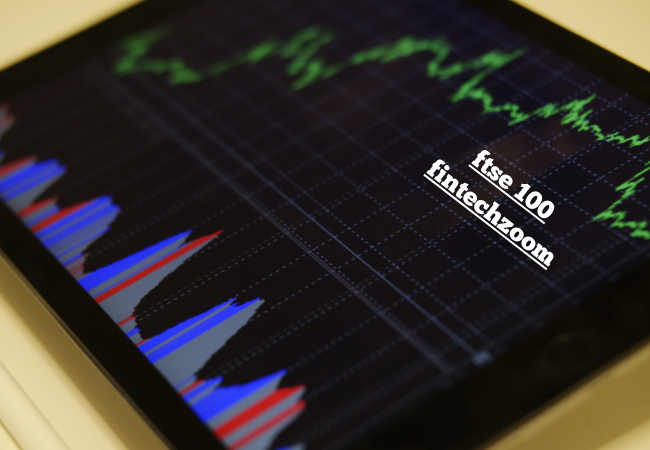The ftse 100 fintechzoom, often referred to as the Financial Times Stock Exchange 100 Index, is a pivotal benchmark in the world of finance, representing the performance of the top 100 companies listed on the London Stock Exchange. This index serves as a barometer for the health of the UK economy and a key indicator for investors worldwide.
In the digital age, platforms like FintechZoom have revolutionized the way investors interact with financial data. FintechZoom offers a modern, user-friendly interface that provides real-time data, analytics, and insights, making it an invaluable tool for those tracking the FTSE 100. Understanding the relationship between the FTSE 100 and FintechZoom can offer profound insights into the evolving landscape of financial markets.
FTSE 100: An Overview
The ftse 100 fintechzoom was established in January 1984 and has since become one of the most significant stock indices globally. It comprises the 100 largest companies by market capitalization listed on the London Stock Exchange, covering a wide range of industries including banking, oil and gas, pharmaceuticals, and consumer goods.
The performance of the FTSE 100 is a key indicator of the overall health of the UK economy. It is widely used by investors, fund managers, and policymakers to gauge market trends and economic conditions. Key players in the FTSE 100 include multinational giants like HSBC, BP, GlaxoSmithKline, and Unilever. The index is recalibrated quarterly to ensure it accurately reflects the current market landscape.
FintechZoom: A Modern Financial Platform
FintechZoom is a cutting-edge financial platform that leverages technology to provide comprehensive financial data and analysis. Launched in the early 2010s, FintechZoom has quickly become a go-to resource for investors seeking real-time information and sophisticated analytics.
The platform offers a range of services, including market data, news, analysis, and trading tools. Its user-friendly interface and advanced features make it accessible to both novice and experienced investors. FintechZoom covers a wide array of financial instruments, including stocks, bonds, commodities, and cryptocurrencies, with a particular emphasis on major stock indices like the FTSE 100.
The Intersection of FTSE 100 and FintechZoom
FintechZoom plays a crucial role in tracking and analyzing the performance of the FTSE 100. By providing real-time data and comprehensive analytics, FintechZoom enables investors to make informed decisions based on the latest market trends. The platform offers detailed information on individual FTSE 100 companies, including stock prices, financial statements, and historical performance data.
One of the key benefits of using FintechZoom for FTSE 100 analysis is its ability to present data in a visually appealing and easy-to-understand format. Charts, graphs, and interactive tools help investors quickly grasp complex information and identify trends. Additionally, FintechZoom offers personalized alerts and notifications, ensuring that investors are always aware of significant market movements.
Several case studies highlight the effectiveness of FintechZoom in analyzing FTSE 100 companies. For instance, during the COVID-19 pandemic, FintechZoom provided critical insights into the impact of the crisis on FTSE 100 companies, helping investors navigate the volatile market conditions. Companies like AstraZeneca and Tesco, which are part of the FTSE 100, saw their stock prices fluctuate significantly, and FintechZoom’s real-time data proved invaluable for investors looking to capitalize on these movements.
Impact of Fintech on FTSE 100
Fintech innovations have had a profound impact on FTSE 100 companies. The adoption of advanced technologies, such as artificial intelligence, blockchain, and big data analytics, has transformed the way these companies operate and engage with their customers.
For example, HSBC, one of the largest banks in the FTSE 100, has invested heavily in fintech solutions to enhance its digital banking services. Similarly, BP has leveraged blockchain technology to improve its supply chain management and reduce operational costs. These innovations have not only boosted the performance of individual companies but have also contributed to the overall growth and stability of the FTSE 100.
Looking ahead, the influence of fintech on FTSE 100 companies is expected to grow. Emerging technologies like quantum computing and advanced machine learning algorithms hold the potential to further revolutionize the financial industry. As these technologies become more integrated into the operations of FTSE 100 companies, their impact on the index’s performance will likely become even more pronounced.
Advantages of Using FintechZoom for Investors
FintechZoom offers several advantages for investors looking to track and analyze the FTSE 100. One of the most notable features is its user-friendly interface, which makes it easy for investors to navigate the platform and access the information they need. The platform’s real-time data and analytics capabilities provide up-to-the-minute information, enabling investors to make informed decisions quickly.

In addition to real-time data, FintechZoom offers a range of analytical tools that help investors develop and refine their investment strategies. These tools include advanced charting capabilities, financial modeling, and risk assessment features. By using these tools, investors can gain a deeper understanding of market trends and identify potential investment opportunities.
FintechZoom also supports social trading, allowing users to follow and learn from successful investors. This feature can be particularly beneficial for novice investors looking to gain insights and improve their trading skills. Furthermore, FintechZoom’s mobile app ensures that investors can stay connected to the market and manage their portfolios from anywhere, at any time.
Challenges and Risks
Despite its many advantages, there are potential drawbacks to relying on FintechZoom for financial analysis. One of the primary concerns is market volatility. Real-time data can be both a blessing and a curse, as it can lead to impulsive decision-making based on short-term market fluctuations. Investors need to exercise caution and maintain a long-term perspective to avoid falling into the trap of reacting to every market movement.
Data accuracy is another critical issue. While FintechZoom strives to provide accurate and reliable information, discrepancies can occur, particularly during periods of high market volatility. Investors should cross-reference data from multiple sources to ensure they are making well-informed decisions.
Cybersecurity is also a significant concern in the digital age. As a platform that handles sensitive financial data, FintechZoom must implement robust security measures to protect its users from cyber threats. Investors should be aware of the potential risks and take necessary precautions, such as using strong passwords and enabling two-factor authentication, to safeguard their accounts.
Conclusion
The synergy between the FTSE 100 and FintechZoom represents a powerful combination of traditional financial benchmarks and modern technological innovation. The FTSE 100 provides a reliable indicator of the UK economy’s health, while FintechZoom offers a dynamic platform for analyzing and understanding market trends.
By leveraging the strengths of both, investors can gain a comprehensive understanding of the financial market and make more informed investment decisions. As fintech continues to evolve, platforms like FintechZoom will play an increasingly important role in shaping the future of financial analysis and investment strategies.
In conclusion, the relationship between the FTSE 100 and FintechZoom highlights the transformative impact of technology on the financial industry. By embracing these innovations, investors can navigate the complexities of the market with greater confidence and precision, ultimately enhancing their ability to achieve their financial goals.


